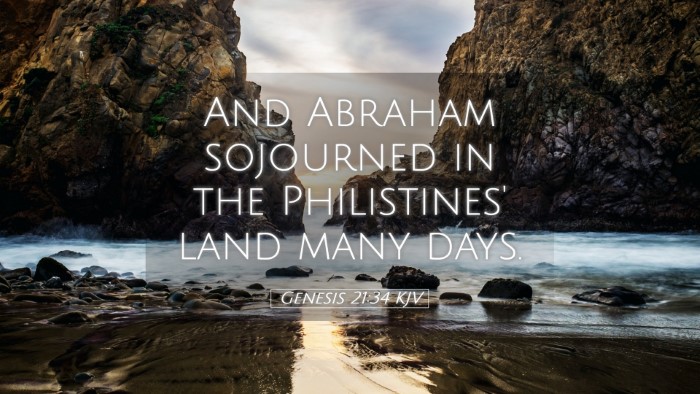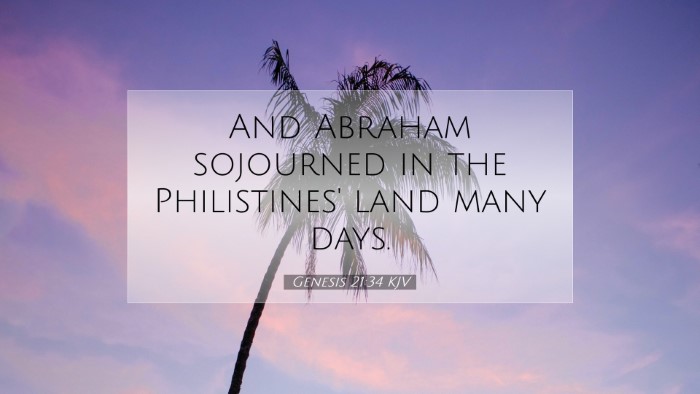Commentary on Genesis 21:34
Text of Genesis 21:34: "And Abraham sojourned in the Philistines' land many days."
This verse marks a significant moment in the biblical narrative, encapsulating the themes of sojourning, divine promise, and the ongoing relationship between Abraham and the land of Canaan, which is integral to the understanding of God's covenant with His chosen people.
Overview
In this brief verse, significant theological and practical implications are presented. Scholars such as Matthew Henry, Albert Barnes, and Adam Clarke provide illuminating insights into the context and spiritual significance of Abraham's sojourn in the land of the Philistines.
Contextual Background
This verse follows the account of the birth of Isaac and the subsequent expulsion of Hagar and Ishmael. Abraham's journeys have led him to different lands, representing his role as a nomadic patriarch, but this particular stay among the Philistines highlights a deeper engagement with the surrounding cultures and demonstrates the broader narrative of God's redemptive plan.
Matthew Henry's Commentary
Matthew Henry emphasizes the notion of sojourning as a form of living in this world while maintaining a focus on spiritual promises. He observes that Abraham, despite having been promised the land, remains a stranger and a pilgrim. His commentary makes the point that this condition of being a sojourner should resonate with all believers today:
- Human Life as a Pilgrimage: Just as Abraham was not rooted in one location, Christians today are reminded that their true home is in heaven.
- Interaction with Secular Cultures: Abraham's sojourn emphasizes the intricate balance between being in the world and not of the world, as he must navigate life among the Philistines while holding on to God's promises.
Albert Barnes' Insights
Albert Barnes provides a critical examination of the term sojourned, linking it to the broader narrative of Abraham's life, as a period of longer stay compared to earlier transitory movements. He highlights several key points:
- Duration and Intent: The phrase “many days” implies a significant time period during which Abraham and his household interacted with the Philistines, potentially deepening relations and impacting their worldview.
- Witness to the Philistines: Barnes posits that the presence of Abraham serves as a witness to the surrounding nations regarding the power and nature of the true God.
Adam Clarke's Observations
Adam Clarke provides a rich theological reflection on the implications of Abraham's sojourn. He stresses the importance of this moment in relationship to the Covenant:
- Covenant Significance: Clarke notes that even in a foreign land, God’s covenant remains intact, illustrating that God's promises transcend geographical boundaries.
- Lessons on Faith: Abraham's extended stay invites reflection on faith in the midst of uncertainty and the importance of maintaining faith in God’s promises even when circumstances seem contrary.
Spiritual Applications
The verse stands as a profound reminder for modern believers regarding their own spiritual journeys:
- Living as Temporary Residents: Just as Abraham lived as a stranger, Christians today should approach life with a recognition that their ultimate home lies beyond this world.
- Engagement with Society: Abraham’s relationship with the Philistines serves as a model for how believers can engage with broader culture while remaining distinct in character and faith.
- Reliance on God’s Promises: This verse encourages believers to trust in the unseen, to cling to the promises of God during seasons of uncertainty, and to find peace in His presence.
Conclusion
Genesis 21:34 succinctly encapsulates the tension and promise of Abraham's life—a life characterized by faith, sojourning, and a covenant promise from God that continues to resonate through generations. The insights from biblical commentary unveil the richness of this verse, challenging readers to reflect on their own lives as journeys of faith marked by God's faithfulness amidst worldly challenges.


